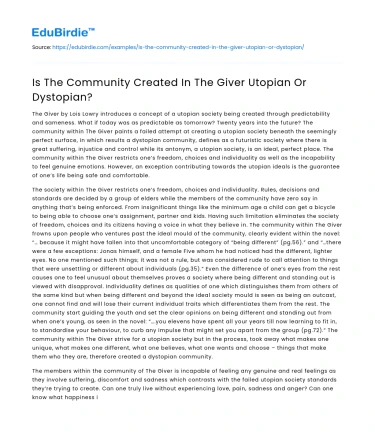The Giver by Lois Lowry introduces a concept of a utopian society being created through predictability and sameness. What if today was as predictable as tomorrow? Twenty years into the future? The community within The Giver paints a failed attempt at creating a utopian society beneath the seemingly perfect surface, in which results a dystopian community, defines as a futuristic society where there is great suffering, injustice and control while its antonym, a utopian society, is an ideal, perfect place. The community within The Giver restricts one’s freedom, choices and individuality as well as the incapability to feel genuine emotions. However, an exception contributing towards the utopian ideals is the guarantee of one’s life being safe and comfortable.
The society within The Giver restricts one’s freedom, choices and individuality. Rules, decisions and standards are decided by a group of elders while the members of the community have zero say in anything that’s being enforced. From insignificant things like the minimum age a child can get a bicycle to being able to choose one’s assignment, partner and kids. Having such limitation eliminates the society of freedom, choices and its citizens having a voice in what they believe in. The community within The Giver frowns upon people who ventures past the ideal mould of the community, clearly evident within the novel: “… because it might have fallen into that uncomfortable category of “being different” (pg.56).” and “…there were a few exceptions: Jonas himself, and a female Five whom he had noticed had the different, lighter eyes. No one mentioned such things; it was not a rule, but was considered rude to call attention to things that were unsettling or different about individuals (pg.35).” Even the difference of one’s eyes from the rest causes one to feel unusual about themselves proves a society where being different and standing out is viewed with disapproval. Individuality defines as qualities of one which distinguishes them from others of the same kind but when being different and beyond the ideal society mould is seen as being an outcast, one cannot find and will lose their current individual traits which differentiates them from the rest. The community start guiding the youth and set the clear opinions on being different and standing out from when one’s young, as seen in the novel: “….you elevens have spent all your years till now learning to fit in, to standardise your behaviour, to curb any impulse that might set you apart from the group (pg.72).” The community within The Giver strive for a utopian society but in the process, took away what makes one unique, what makes one different, what one believes, what one wants and choose – things that make them who they are, therefore created a dystopian community.
The members within the community of The Giver is incapable of feeling any genuine and real feelings as they involve suffering, discomfort and sadness which contrasts with the failed utopian society standards they’re trying to create. Can one truly live without experiencing love, pain, sadness and anger? Can one know what happiness is without suffering from sadness? Feelings and emotions shape a person as much as any other traits, without experiencing an emotion, can one really know what the other one feels like? The members of the community simply cannot feel love. If a twin is born, one is to be released because they’re too emotionally attached. A birthmother will never look after her own child. A couple will get assigned a child birthed by someone else. There’s never room for emotional attachment to form when two parents get assigned a child and the meaning of love is not understood by members of the community, clearly seen evident in the novel: “ “Do you love me?” There was an awkward silence for a moment. Then father gave a little chuckle. “Jonas. You. Out of all people. Precision of language, please!” “What do you mean?” Jonas asked. Amusement was not at all what he had anticipated. “Your father means that you used a very generalised word, so meaningless that it’s become almost obsolete (pg. 162).” ” By taking away one’s capability to feel emotions, it’s almost like one is being stripped of who they are. Feelings and emotions don’t just bring suffering, sadness and discomfort but brings one the ability to understand themselves better and to connect with others. The community within The Giver took away the one of the most important aspect of one’s life, demonstrating a dystopian society.
Despite important factors of one’s life being taken away, the community within The Giver have contributing properties towards the utopian ideals - the guarantee of one’s life being safe and comfortable. All members of the community are healthy, well-nourished with scheduled food and a safe place to sleep at night. Rules like pilots can’t fly over the community and no hate or violence are permitted ensures a safe environment for all members. Everyone within the community is contributing and taking at the same time. Everyone is equal but respect to elders is essential. Moving past the heavy dystopian aspects of the community, these ideals are part of what contributes to an utopian society.
In short, beneath the illusion that Lois Lowry’s The Giver tried to paint a utopian society through predictability and sameness, deep aspects shows a dystopian community. The Giver’s society restricts one’s freedom, choices and individuality. Takes away what makes life worth living – the capability to feel real emotions. The community has utopian ideals but in the end, when one’s living without freedom, choices, individuality and the capability to feel emotions…are they really living at all?






 Stuck on your essay?
Stuck on your essay?

